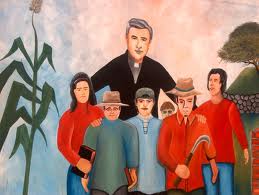Comparative philosophy—sometimes called “cross-cultural philosophy”—is a subfield of philosophy in which philosophers work on problems by intentionally setting into dialogue sources from across cultural, linguistic, and philosophical streams. The ambition and challenge of comparative philosophy is to include all the philosophies of global humanity in its vision of what is constituted by philosophy.
Internet Encyclopedia of Philosophy

Liberation theology is a Christian movement in political theology that interprets the teachings of Jesus Christ in terms of a liberation from unjust economic, political, or social conditions. It has been described by proponents as “an interpretation of Christian faith through the poor’s suffering, their struggle and hope, and a critique of society and the Catholic faith and Christianity through the eyes of the poor, and by detractors as Christianized Marxism.
Although liberation theology has grown into an international and inter-denominational movement, it began as a movement within the Roman Catholic church in Latin America in the 1950s-1960s. Liberation theology arose principally as a moral reaction to the poverty caused by social injustice in that region. The term was coined in 1971 by the Peruvian priest Gustavo Gutierrez, who wrote one of the movement’s most famous books. A Theology of Liberation. Other noted exponents are Leonardo Boff of Brazil, John Sobrino of El Salvador, and Juan Luis Segundo of Uruguay.
Wikipedia